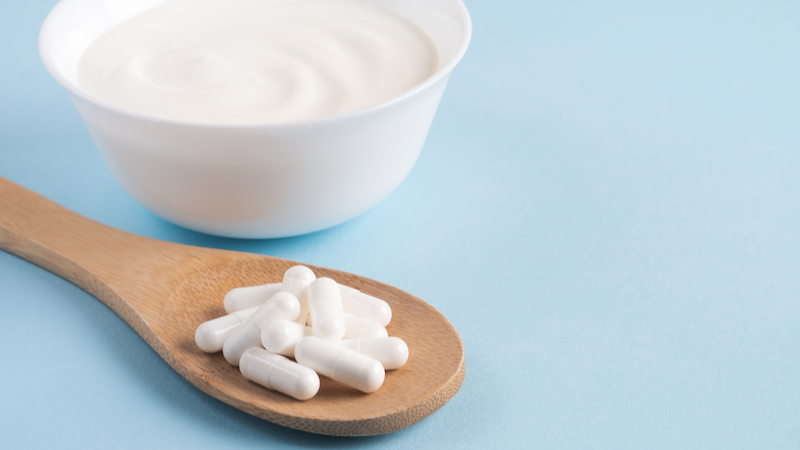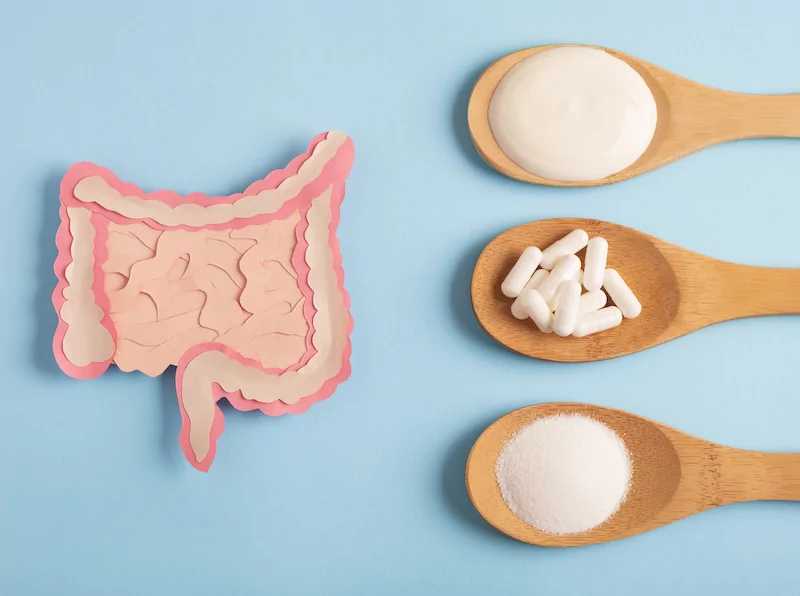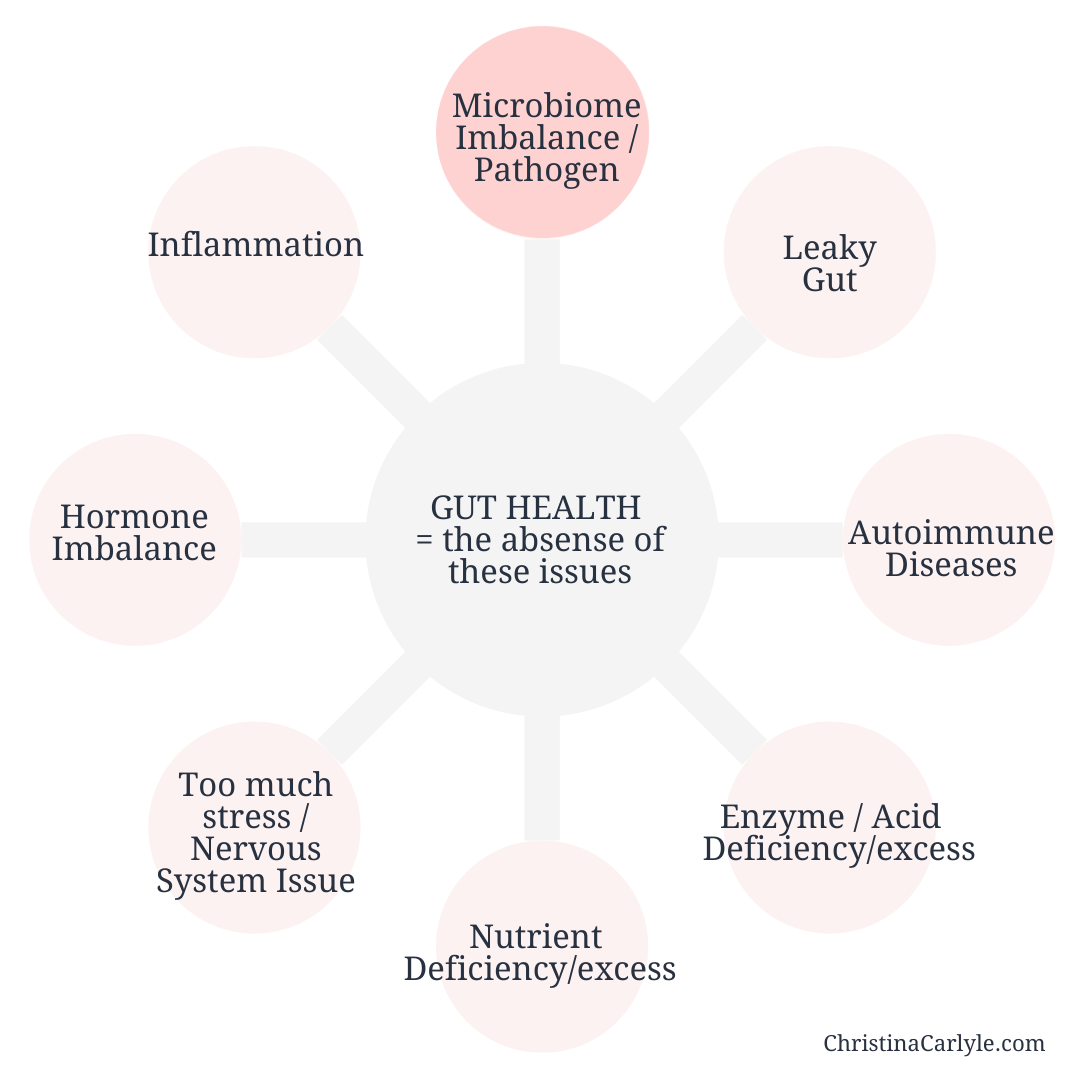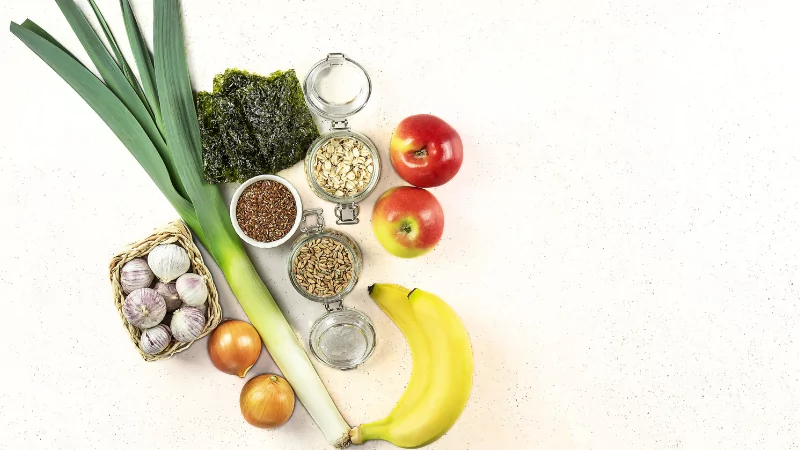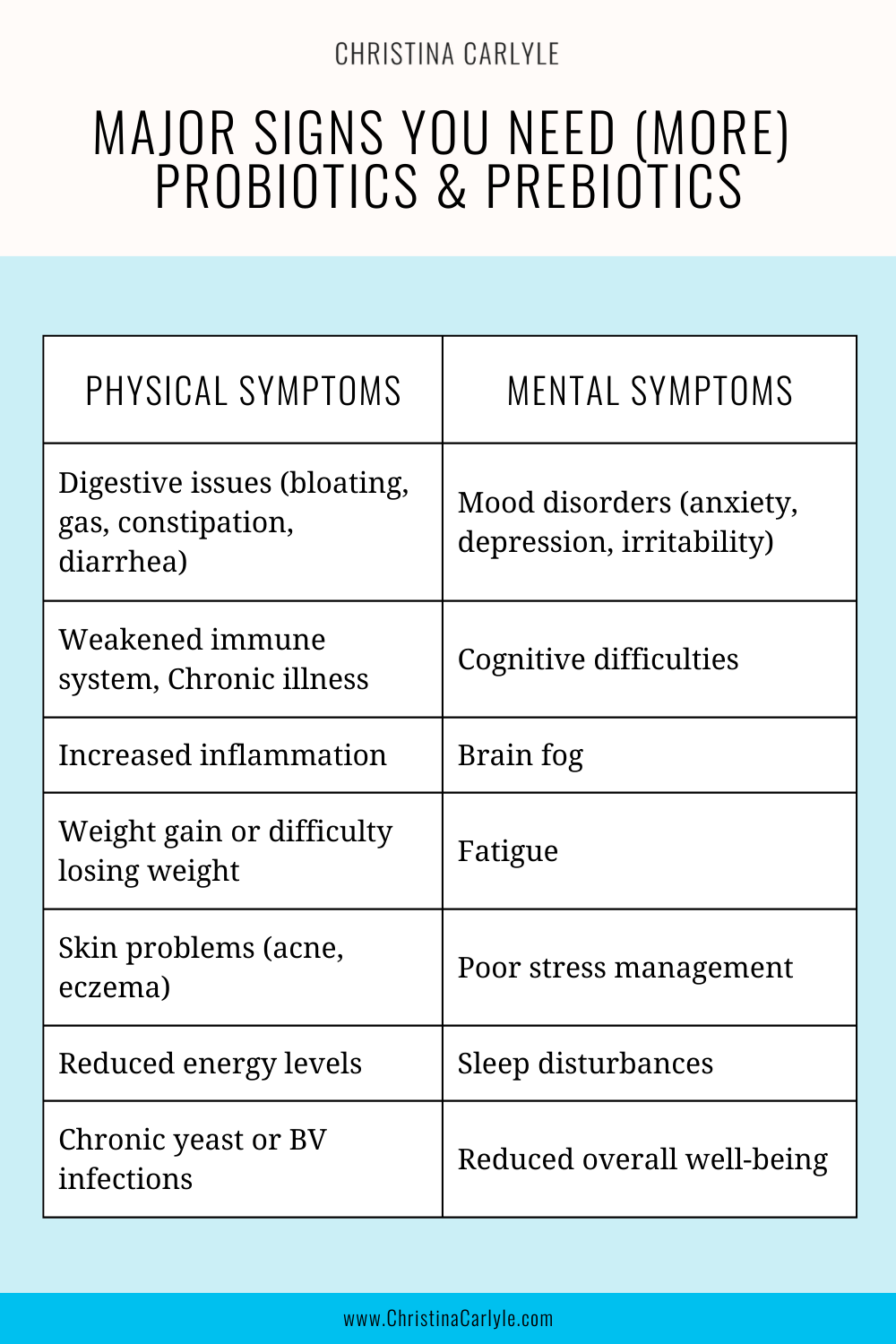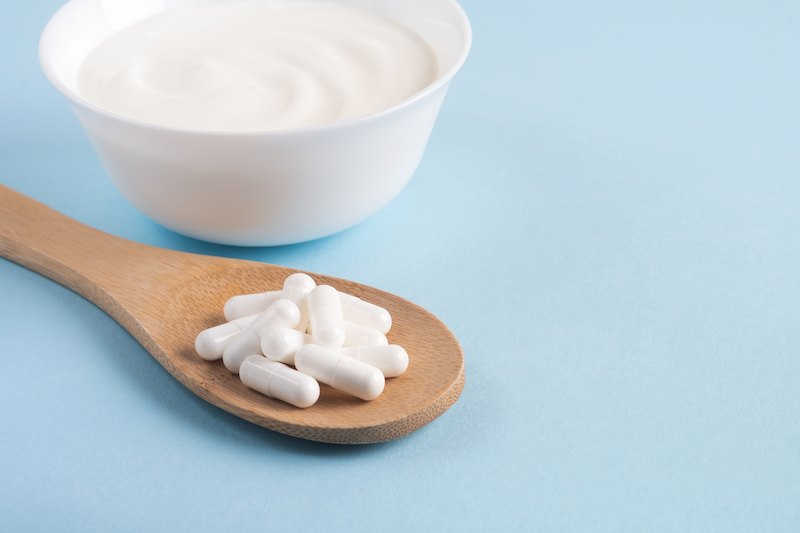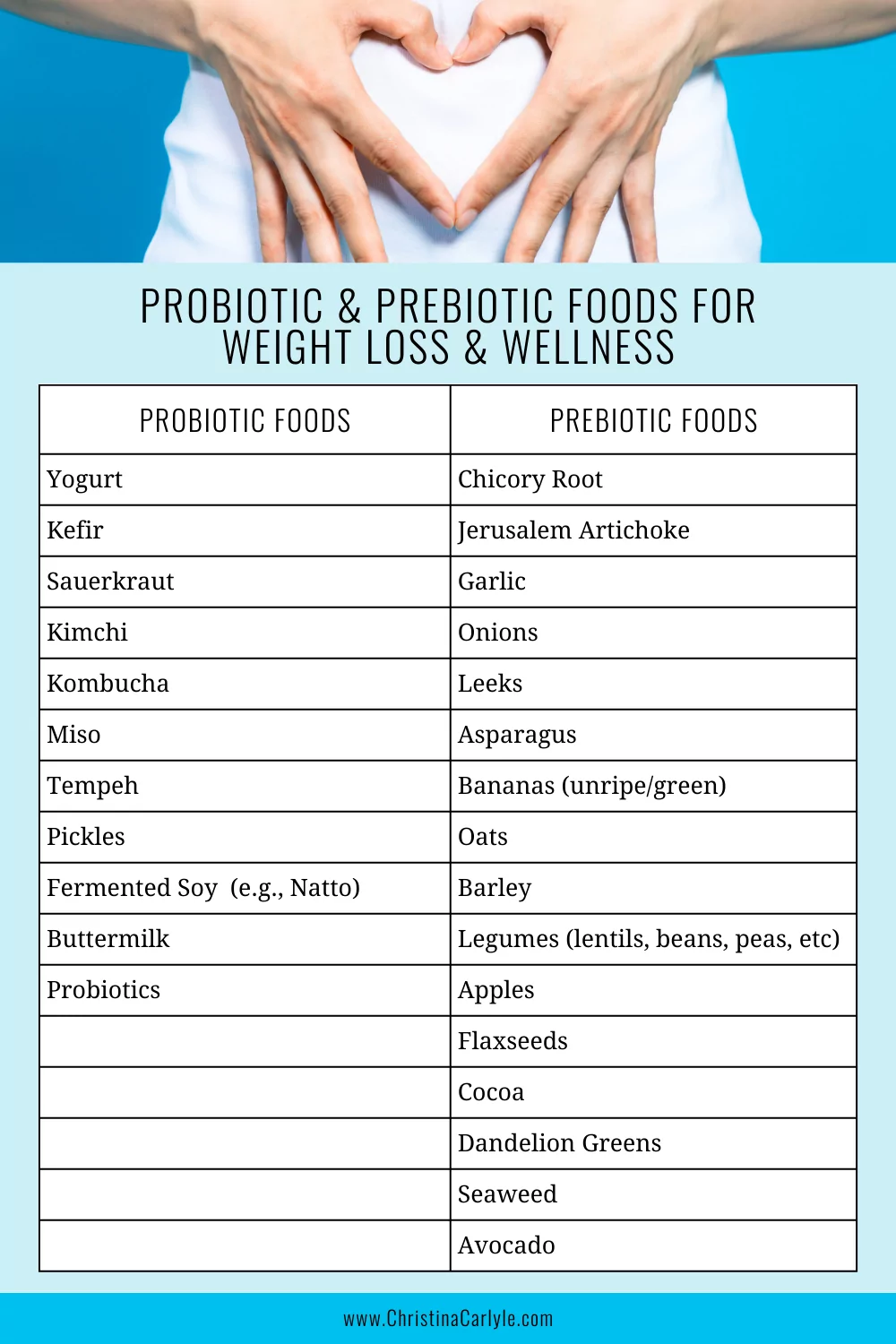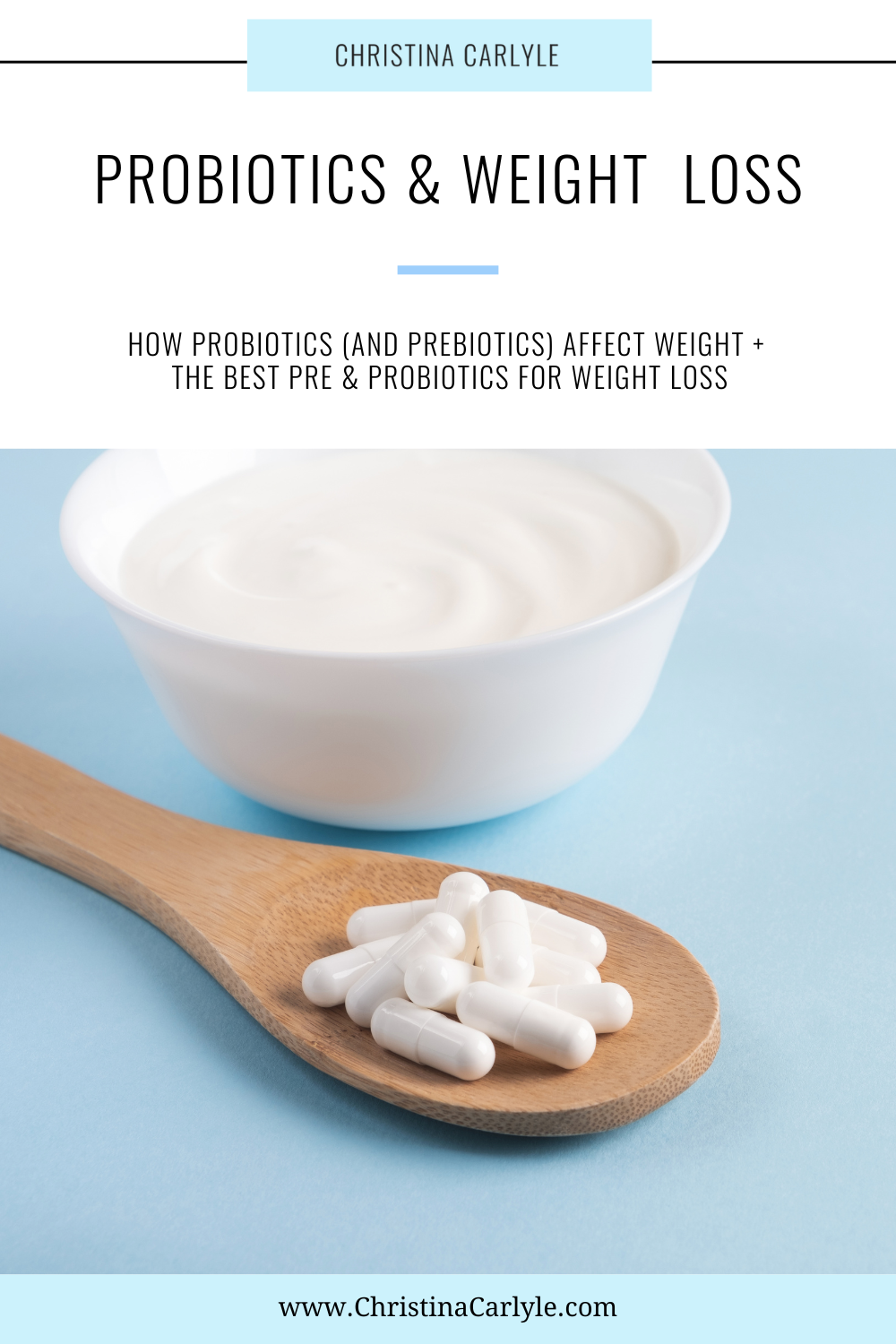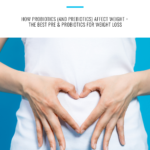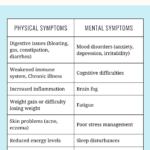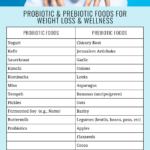Last Updated on June 17, 2023
Probiotics and prebiotics are important for weight and health. In fact, probiotics & prebiotics may just be the secret sauce that make it easier to reach your weight loss and wellness goals… hello flat abs and definition.
In the holistic weight loss & wellness world probiotics are a priority. When probiotic count is low, it creates an environment for pathogens to overgrow.
As this happens inflammation, GI issues, fatigue, mood issues, cravings, hunger, skin breakouts, and stubborn fat can occur. If left untreated symptoms will continue to get worse.
I see this happen a LOT in my clients. So many people struggle with weight loss because of unresolved gut microbiome imbalances.
It’s kinda hard to get flat-toned abs, stick to a diet, and feel motivated to work out if you’re always bloated and battling cravings, inflammation, water retention, and fatigue/mood swings, isn’t it?
Probiotics help prevent & reverse pesky symptoms like that. I see a lot of influencers recommending green drinks for weight loss… but nobody really promotes probiotics. And probiotics are proven to help weight loss! NOT green drinks!
Studies suggest that probiotics & prebiotics may influence weight and aid in metabolism optimization and weight loss in several ways.. from a reduction in waistline, cravings, fatigue, and inflammation to the improvement of energy, nutrient absorption, muscle mass, and exercise performance.
There’s still much science emerging about all of the benefits of probiotics for weight loss and wellness.
After learning SO MUCH about how pro and pre-biotics can affect weight and health over the years – I wanted to create a guide to probiotics for you!
By the time you’re done reading you’ll know:
- What probiotics (and prebiotics) are
- How probiotics (and prebiotics) affect weight
- Intake guidelines for weight loss & wellness
- The best supplement probiotics and gut-friendly foods for weight loss & wellness
- Best Probiotic foods
Let’s dig in.
First things first, what the heck are probiotics?
What are probiotics and prebiotics?
The number of microbes in your gut outnumber the number of cells in your body. You have trillions of microbes in your gut that control the way you think, your mood, cravings, immunity, and also metabolism.
Probiotics are technically microbes that live in your ‘gut’ specifically in your intestines… they also live all over your body, too.
You have microbes all over your body, on your skin, vagina, sinuses, and in your mouth, among other places. These good bacteria are responsible for keeping the balance of the microorganism in our gut.
Prebiotics are non-digestible fibers that serve as a food source for beneficial bacteria in the gut.
Probiotics and prebiotics are two distinct components that play important roles in promoting gut health, but they have different functions:
Probiotics: Probiotics are live microorganisms, typically bacteria or yeast, that confer health benefits when consumed in adequate amounts. They are beneficial bacteria that help maintain a healthy balance of microorganisms in the gut. Probiotics can be found naturally in certain foods, such as yogurt, kefir, sauerkraut, and kimchi, or they can be taken as supplements. When consumed, probiotics colonize the gut and interact with the existing microbiota, promoting a favorable balance of bacteria and supporting various aspects of the gut and overall health.
Prebiotics: Prebiotics are a type of dietary fiber that serves as food for the beneficial bacteria in the gut. They are not living organisms themselves but rather indigestible components found in certain foods. Prebiotics are not broken down or absorbed in the small intestine, but they reach the colon intact, where they are selectively fermented by gut bacteria. This fermentation process stimulates the growth and activity of beneficial bacteria, promoting a healthier gut microbiota. Common prebiotic fibers include inulin, fructooligosaccharides (FOS), galactooligosaccharides (GOS), and resistant starch.
Supplementing your diet with probiotics and prebiotics helps maintain gut health. Once the microbiome is imbalanced other gut health issues can manifest quickly.
So a really quick recap about the difference between pre and probiotics:
- Probiotics are live microorganisms that provide health benefits when consumed, while prebiotics are non-living dietary fibers that serve as food for beneficial bacteria.
- Probiotics introduce beneficial microorganisms into the gut, whereas prebiotics provide nourishment to support the growth and activity of existing beneficial bacteria.
- Both probiotics and prebiotics are important for maintaining healthy gut microbiota and optimal gut health.
Now that you know the benefits of probiotics and prebiotics, let’s go over why they’re beneficial (aka why you need them) and how they can help you get fit and healthy!
PROBIOTICS & WEIGHT
The human gut is home to a complex ecosystem of microorganisms, including bacteria, viruses, fungi, and other microbes. There are both beneficial or “good” bacteria and potentially harmful or “bad” microbes that exist naturally in the body. This balance between beneficial and harmful microorganisms is crucial for maintaining a healthy gut, overall well-being, and healthy weight.
When the balance between good and bad microbes is disrupted, it can lead to dysbiosis, an imbalance in the gut microbiota. This imbalance can contribute to various health issues, including gastrointestinal disorders, immune dysfunction, inflammation, and increased susceptibility to infections. It can also slow the metabolism and make fat more stubborn.
This video discusses the importance of the gut microbiome for health (physical & mental) and weight loss.
Bottom line you need probiotics to keep the good gut microbes strong and functioning properly… otherwise you can experience nasty side effects that make it easier to gain weight and stay stuck feeling unmotivated to do anything about it.
How probiotics affect weight
Here are six scientifically proven ways that probiotics can affect weight:
- Regulation of gut microbiota: Probiotics help maintain a healthy balance of bacteria in the gut. An imbalance in gut microbiota, known as dysbiosis, has been linked to weight gain and obesity. Certain strains of probiotics can promote the growth of beneficial bacteria, such as Bifidobacteria and Lactobacillus, can have a positive impact on weight regulation.
- Appetite control: Probiotics can affect appetite-regulating hormones, such as leptin and ghrelin. Leptin helps signal satiety and regulates energy balance, while ghrelin stimulates appetite. Some studies suggest that certain probiotic strains may decrease ghrelin levels and increase leptin levels, leading to reduced appetite and calorie intake.
- Fat absorption and metabolism: Probiotics may influence the way the body absorbs and metabolizes dietary fats. They can enhance the production of short-chain fatty acids (SCFAs) like butyrate, which can promote fat oxidation, increase energy expenditure, and inhibit fat storage. This may have implications for weight management.
- Regulation of inflammation: Chronic low-grade inflammation is associated with obesity and metabolic disorders. Probiotics have been shown to modulate the immune response and reduce inflammation in the gut. By reducing inflammation, probiotics may help prevent insulin resistance and metabolic dysfunction, which can contribute to weight gain.
- Improvement of gut barrier function: The gut lining acts as a barrier, preventing harmful substances from entering the bloodstream. Probiotics can enhance the integrity of the gut barrier by promoting the production of mucus and strengthening the tight junctions between intestinal cells. A healthy gut barrier may prevent the leakage of toxins and inflammatory molecules, which could potentially contribute to weight gain.
- Regulation of energy balance: Probiotics can influence the production and metabolism of certain substances involved in energy balance, such as short-chain fatty acids, bile acids, and peptides. These interactions can affect the efficiency of energy extraction from food, as well as fat storage and utilization, potentially influencing weight regulation.
- Manipulation of Mood: Emerging research suggests a link between gut health and mental health, with probiotics showing promise in improving mood and reducing symptoms of anxiety, depression, and fatigue.
So when you have enough probiotics it’s easier to be energized, healthy, and have a fast metabolism. But that’s just how probiotics can affect weight. You may have heard of prebiotics… prebiotics helps probiotics colonize and also can aid with weight loss & wellness.
You need both probiotics for maximum benefits… so if you’ve ever take probiotics but didn’t feel any different this is important.
Also, if you ever hear someone say probiotics don’t help BMI/weight loss – tell them to show you a study with probiotics paired with prebiotics and a full spectrum probiotic-friendly diet that didn’t improve weight… in a study in which participants were in a calorie deficit.
They won’t be able to. There are studies saying the probiotics have a minimal effect on weight…. that’s because the study was testing supplements alone NOT quality supplements + live cultures from food sources + prebiotics + a unique combination of synbiotics).
In the holistic weight loss & health world (aka mine) you need a blend of high-quality sources to get tangible benefits you can see and feel. But above all else you have to be in a calorie deficit to lose weight.
But probiotics help weight loss and health in other ways. So an (appropriate) deficit + probiotics can help enhance your weight loss experience and get better results.
This post is about weight loss and probiotics. But I made complete guides discussing the other health benefits you can get from probiotics… and those health benefits can aid weight loss, too.
PREBIOTICS & WEIGHT
Prebiotics impact on weight can be indirect rather than direct. By promoting the growth and activity of these beneficial bacteria, prebiotics can have several effects that may influence weight:
- Increased Satiety: Prebiotics can enhance feelings of fullness and satiety, which may help reduce overall calorie intake. They can stimulate the release of hormones that regulate appetite, such as peptide YY (PYY) and glucagon-like peptide-1 (GLP-1), leading to reduced food intake.
- Improved Glucose Regulation: Prebiotics have been shown to improve glucose metabolism by enhancing insulin sensitivity and reducing blood sugar spikes. By promoting better blood sugar control, prebiotics may indirectly contribute to weight management, as unstable blood sugar levels can lead to increased hunger and cravings.
- Enhanced Fat Metabolism: Some studies suggest that prebiotics can influence fat metabolism and potentially promote the breakdown of stored fat. They may increase the production of short-chain fatty acids (SCFAs), such as butyrate, which can influence lipid metabolism and help regulate fat storage.
- Modulation of Gut Microbiota: Prebiotics selectively stimulate the growth of beneficial bacteria in the gut, such as Bifidobacteria and Lactobacilli. These bacteria produce metabolites, including SCFAs, that can influence energy homeostasis and contribute to weight management.
Do you need more probiotics? Will increasing probiotic intake help you lose weight?
Let’s find out!
SYMPTOMS THAT YOU NEED MORE
A diet deficient in probiotics and prebiotics or a diet that causes gut dysbiosis can lead to various health and weight-related symptoms.
Here are some common symptoms that may arise when :
- Digestive Issues: One of the primary signs of a probiotic and prebiotic deficiency is digestive problems. You may experience frequent bloating, gas, constipation, diarrhea, or irregular bowel movements.
- Weakened Immune System: Probiotics play a crucial role in supporting immune function. Without sufficient probiotics and prebiotics, your immune system may become compromised, making you more susceptible to infections, allergies, and illnesses.
- Increased Inflammation: Probiotics and prebiotics help maintain a healthy balance of gut bacteria, which plays a key role in reducing inflammation. In their absence, inflammation levels may rise, leading to issues like joint pain, skin problems, and chronic inflammation-related conditions.
- Weight Gain or Difficulty Losing Weight: An imbalance in gut bacteria can affect metabolism, nutrient absorption, and appetite regulation.
- Mood Disorders: The gut and brain are interconnected, and gut health can influence mental well-being.
- Reduced Energy Levels: A healthy gut microbiome helps with the breakdown and absorption of nutrients, which are essential for energy production. When lacking probiotics and prebiotics, nutrient absorption is compromised, leading to decreased energy levels and fatigue.
- Skin Issues: Poor gut health can manifest in the form of skin problems, including acne, eczema, or other inflammatory skin conditions.
- Premature aging: A gut microbiome imbalance + impaired nutrient absorption + the inflammatory environment it creates accelerates aging and can cause thinning hair/lashes/brows.
If you want to lose weight and prevent aging, and saggy, loose skin
If you have bloating, breakouts, mood swings, fatigue, inflammation, cravings, thinning hair…
You need probiotics ASAP!
INTAKE GUIDELINES FOR WEIGHT LOSS & WELLNESS
Adding (a lot) more probiotics and prebiotics into your diet can help prevent and reverse symptoms and help you lose weight… assuming you’re also NOT consuming things that fuel bad pathogenic gut microbes.
Here’s a simple protocol to use probiotics help boost gut health, reverse symptoms, maximize metabolism, and lose weight:
- Cut out bad-gut foods, drinks, supplements, and consumables & eat a diet that promotes gut health and healing. You can’t heal the gut simply by eating healthy… you have to avoid the wrong things and eat the right things to heal the gut and reverse inflammation, microbiome, hormone, toxicity, metabolic, and nutrient absorption issues. (That’s what my Total Transformation Program does)
- Repopulate your gut with Probiotic supplements.
- Eat high Probiotic and Prebiotic foods with every meal. (at least one serving of both per meal.)
- Engage in a healthy lifestyle & other healthy habits that support gut health and metabolism (like stress management, hydration, exercise, supplementation, etc. – all of which are covered in my Total Transformation Program)
You have to have all steps in place to get benefits… if you’ve taken a probiotic before but didn’t feel a difference it’s because you were missing the other two critical steps!
\When you combine the right diet + healing protocols & supplements you’ll get results you can see and feel a LOT faster.
You can’t really fix a problem if your diet is causing issues in the first place. And supplements won’t do much if you’re fueling inflammation and pathogens with a bad diet.
If you really want to clean up your diet, heal your gut, reverse inflammation, balance hormones, and get rid of fatigue and cravings – AND lose weight – you need my Total Transformation Program.
Use my mini protocol + Gut Health and Weight Loss Guide + the pre and probiotics that I recommend along with my Total Transformation Program for the best results.
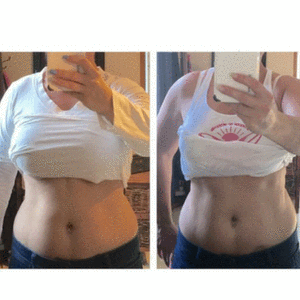
4 week before and afters on my Total Transformation Program
THE BEST PROBIOTICS SUPPLEMENTS FOR WEIGHT LOSS
After you cut out problematic foods, start supplementing with probiotics ASAP.
I recommend having at least one serving of probiotic supplements a day.
See the probiotic (and digestive health) supplements I recommend.
If you’re experiencing symptoms of probiotic deficiency that I listed above I recommend starting with 100 billion CFUs.
There are prebiotic supplements available, but it’s way better to get your prebiotics from whole food sources instead. Fiber is best fresh. Fiber supplements are pointless and don’t help colonize as well as real food fibers do! There are also different types of prebiotic fibers you need to get weight loss & health benefits. I included them in my prebiotics guide for you. xo
That means you’ll need a diverse range of probiotic & prebiotic-friendly foods in your diet, too.
BEST PROBIOTIC FOODS FOR WEIGHT LOSS
Eating both probiotics (prebiotics) help stop cravings, and regulate hunger, and blood sugar. They also help repopulate the gut microbiome which improves mood, immunity, metabolism, and energy.
It’s important to consume a diet rich in organisms and fiber… doing so creates an environment in which healthy probiotics can thrive.
To lose weight you have to feed the microbes that encourage weight loss. Without a high pro & prebiotic diet it’ll be difficult to maintain healthy probiotic levels needed to see/feel results.
These following pro and prebiotic foods help reduce visceral fat, which is particularly harmful and associated with chronic diseases.
I recommend eating at least one serving of pro and prebiotics at every meal.
| Probiotic Foods | Prebiotic Foods |
|---|---|
| Yogurt | Chicory Root |
| Kefir | Jerusalem Artichoke |
| Sauerkraut | Garlic |
| Kimchi | Onions |
| Kombucha | Leeks |
| Miso | Asparagus |
| Tempeh | Bananas (unripe/green) |
| Pickles | Oats |
| Fermented Soy Products (e.g., Natto) | Barley |
| Buttermilk | Legumes (lentils, chickpeas, beans, peas) |
| Probiotics | Apples |
| Flaxseeds | |
| Cocoa | |
| Dandelion Greens | |
| Seaweed | |
| Avocado |
After giving this list a look ask yourself these questions:
Are you eating multiple sources of these foods daily? With every meal? If the answer is no, you need one of these probiotic supplements ASAP.
I have a complete guide to Probiotics and another complete Guide to Prebiotics for you…
You’ll learn more specifics about the different types of pre and probiotics, how many of each you need, and the benefits of specific types of microbes. You can manipulate the intake of the different beneficial probiotic strains to address specific concerns. I explain more about that when I discuss probiotics and prebiotics independently.
I hope this helped you understand the link between probiotics and weight!
Leave me a comment and let me know if you’re eating enough in your daily diet. If you’re not I hope this inspired you to start…
Because a happy, healthy gut is key to balancing hormones, reversing inflammation, burning fat, getting fit, and feeling awesome.
Remember if you want to burn fat, feel great and get fit fast, my Total Transformation Program can make it happen in 4 weeks flat.
xo
Your Coach and Biggest Cheerleader,
![]()
Pin this to Pinterest so you’ll have it forever
MORE GUT HEALTH & WEIGHT LOSS INFO
Check out these related articles to fill in more of the “gut health puzzle” so you’ll understand more about the different aspects of gut health, how they cause symptoms & weight gain, and how to optimize your gut health to maximize your weight loss potential:
- Gut Health and Weight Loss
- What are Probiotics?
- Probiotics and Weight Loss
- What are Prebiotics?
- The Best Foods for Gut Health
- What is Leaky Gut?
- Gut Health Supplements
- Intestinal Inflammation
- Gut Microbiome
Remember, if you have gut health symptoms you most likely also have metabolic dysfunction. This free training explains more about metabolic dysfunction & how I fix it so you can lose weight & feel great ASAP.

